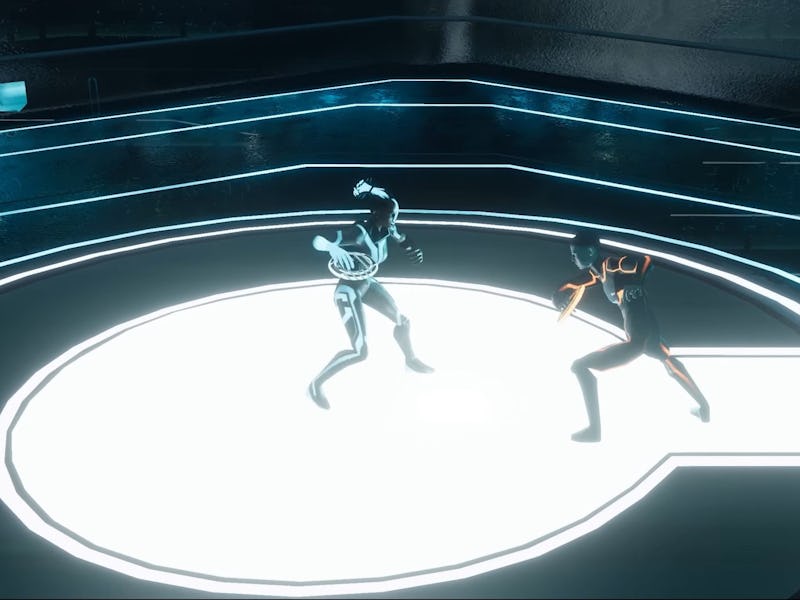Tron: Catalyst Has A Compelling Story To Tell But Gets In Its Own Way
A more vividly realized Grid brings new problems to the next Tron game.

Of all the ‘80s movie series to get a modern-day revival, Tron might be the most baffling. Its sucked-into-the-game plot and groundbreaking but endearingly dorky visual design feel extremely of their time, and after the first film, decades passed without a sequel despite its positive reception. But after 2010’s excellent Tron: Legacy, followed by another long gap, Tron is set to get two video game releases and a film sequel in the span of just over two years.
In 2023, Bithell Games released Tron: Identity, a visual novel following a detective program named Query investigating a crime in the digital city known as the Arq Grid. While it includes plenty of nods to both the original film and Tron: Legacy, Identity can be played as a total standalone, though players with at least a passing familiarity with the computerized world of the series are likely to get more out of it. This summer, the game gets a sequel of its own in Tron: Catalyst, and from the hour-long preview I’ve played, that same dynamic seems to be intact.
Catalyst is a sequel to Identity in that it takes place in the same Arq Grid and features some of the same characters, including Query. However, rather than making it another visual novel, Bithell Games has opted to turn this followup into a roguelike action game that puts an innovative spin on the genre’s looping structure.
In Catalyst, you play as Exo, a courier program who’s caught up in a revolutionary movement after a delivery goes wrong. In the opening moments of the game’s preview demo, one of Exo’s packages explodes, and she wakes up being interrogated by an agent of Core, the Arq Grid’s rulers. After she’s sent to a combat arena to fight for her captors, Exo realizes that she can turn back time, reliving the last few minutes of her life again and again, and sets about using that power to figure out what in the Grid is going on and hopefully earn her freedom.
Exo accidentally becomes essential to the future of the Grid when she catches the attention of multiple clashing factions.
It turns out the bomb in Exo’s messenger back was actually what’s known as a glitch catalyst, a mysterious artifact that somehow holds the key to breaking Core’s control of the Arq Grid. That’s what gives Exo the ability to repeat cycles of time, and interestingly, it’s not just an excuse for typical roguelike looping when she’s defeated. At any time, you can manually reset the loop, bringing items and information into the past to help you.
At first, Catalyst uses this in some pretty perfunctory ways. You’re tossed into the arena without combat training, so you reset and train before starting your fight. Someone you need to talk to in the stands leaves after the fight, so you unlock a shortcut to get there, reset the loop, and skip the battle entirely to meet with them instead. In the preview, the glitch was always used in moments where you simply needed it to progress your quest, and while the conceit is interesting as it is, I’m hoping Exo’s time-warping shenanigans will come into play in more satisfying ways to solve puzzles in the full game.
I’m already considerably more sold on Catalyst’s story, which is no surprise given Bithell Games’ history. On top of Identity’s philosophical dissection of the world of Tron, the developer is also responsible for Subsurface Circular, one of the best detective stories in games as far as I’m concerned. Even in the short time I played, Exo finds herself tangled up with a group of freedom fighters, a retired Query, and a new political faction of programs who live outside of Core’s control. Like Identity, Catalyst seems poised to be a noir-inspired dive into the meaning of Tron’s mythos, and the writing is already compelling enough that I want more.
Tron: Catalyst’s story is already impressive, but its combat holds it back.
However, I’m much less optimistic about Catalyst’s action. Tron already has battles with its chakram-like identity discs and races on its iconic light cycle, and it makes sense that they would make their way into the game. But while zooming through the Arq Grid on a glowing motorcycle is plenty of fun, disc combat feels extremely rough. Exo feels clunky in combat, and long animations make it hard to react to often chaotic fights with the precise timing required. Melee strikes feel weightless and ranged attacks with the disc are unwieldy. It all adds up to a combat system that made me feel like I was fighting my controller more than the onscreen enemies, and I’m left wishing Catalyst had found something other than traditional combat to spice up Exo’s exploration of the Arq Grid.
So far, Tron: Catalyst is a mixed bag. I’m eager to continue the story started in Identity through Bithell Games’ characteristically strong writing, but slogging through unsatisfying fights along the way drags the experience down. The ability to explore the Arq Grid is fun and finding shortcuts through the city works well with its time-looping premise, but when the city is also crawling with enemies, it makes hitting the streets much less appealing. As it stands, I’m mostly left wondering whether Catalyst’s story will actually be good enough to overcome the mediocre combat weighing it down.